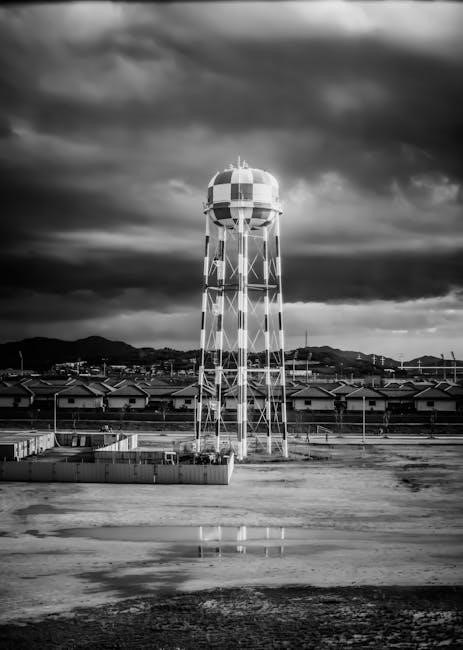Storm of Steel by Ernst Jünger is a gripping memoir of World War I, offering vivid accounts of trench warfare and existential reflections․ Download the PDF;
1․1 Overview of the Memoir
Storm of Steel is a memoir by Ernst Jünger that vividly recounts his experiences as a German soldier during World War I․ The book offers a detailed and unflinching account of trench warfare, nationalistic fervor, and existential reflections․ Jünger’s narrative captures the brutality and camaraderie of war, making it a gripping and introspective read․ The PDF version is widely accessible․
1․2 Historical Context of World War I
World War I (1914–1918) was a global conflict involving major European powers, sparked by complex alliances and nationalist tensions; The war introduced industrialized combat, trench warfare, and unprecedented casualties․ Storm of Steel captures this chaotic era through Ernst Jünger’s eyewitness account, offering a soldier’s perspective on the horrors and camaraderie of frontline combat․ The PDF version provides a vivid historical lens․
Author Background: Ernst Jünger
Ernst Jünger, born in 1895, was a German writer and soldier․ He voluntarily enlisted in 1914, earning the Pour le Mérite for bravery․ His memoir became a literary sensation․
2․1 Biography of Ernst Jünger
Ernst Jünger, born in 1895, was a German writer and philosopher․ He enlisted in the German Army in 1914, fighting in World War I, where he was wounded multiple times․ His experiences shaped his memoir, Storm of Steel, published in 1920․ Jünger became a prominent figure in German literature, exploring themes of war, nationalism, and existentialism․ His work remains influential, with translations like the 1929 English edition widely read․
2․2 Jünger’s Military Career and Motivations
Ernst Jünger enlisted in the German Army in 1914, driven by nationalistic fervor and a thirst for adventure․ He served as a stormtroop officer in the 73rd Hanoverian Fusilier Regiment, earning the Pour le Mérite after multiple wounds․ His bravery influenced his memoir Storm of Steel, reflecting his motivations and experiences․
Structure and Content of the Book
Storm of Steel is structured chronologically, detailing Ernst Jünger’s experiences from 1914 to 1918․ It vividly portrays trench warfare, battles, and camaraderie, blending brutality with reflective introspection․
3․1 Early Experiences in the War
Ernst Jünger vividly recounts his initial enlistment in 1914, fueled by nationalist fervor and a sense of adventure․ His early days in the German Army reveal a young soldier’s enthusiasm, quickly tempered by the harsh realities of training and deployment․ The memoir captures his first encounters with the brutality of war, the camaraderie among soldiers, and the psychological toll of adapting to combat․
3․2 The Great Battle and Its Impact
Ernst Jünger recounts the intensity of the Great Battle, where he witnessed unparalleled destruction and personal sacrifice․ The memoir captures the chaos, fear, and resilience of soldiers under relentless fire․ These experiences profoundly shaped Jünger’s outlook on war, emphasizing survival, camaraderie, and the psychological toll of combat․ The battle’s aftermath left an indelible mark on his perspective, forever altering his view of humanity and conflict․

Literary Style and Themes
Storm of Steel showcases Ernst Jünger’s vivid, lyrical prose, blending nationalism with stark realism․ Themes of survival, camaraderie, and existential reflection define the narrative, capturing the brutality and complexity of war․
4․1 Vivid Descriptions of Trench Warfare
Ernst Jünger masterfully depicts the horrors of trench warfare in Storm of Steel, vividly recounting the relentless bombardments, claustrophobic trenches, and the psychological toll on soldiers․ His unflinching descriptions of combat, such as steel helmets emerging from craters, create a stark, immersive portrayal of World War I’s brutality․ The memoir captures the visceral reality of war, leaving a lasting impact on readers․
4․2 Themes of Nationalism, Camaraderie, and Survival
Storm of Steel explores themes of nationalism, camaraderie, and survival, capturing the intense bonds among soldiers amidst chaos; Jünger portrays nationalism as a driving force, while highlighting the resilience and solidarity that sustained troops․ The memoir also delves into existential struggles, revealing how survival became an primal instinct and sacrifice a testament to duty, offering profound insights into the human condition during war․

Reception and Legacy
Storm of Steel received widespread acclaim for its vivid portrayal of war, with critics praising its honesty and lyrical prose․ Gide hailed it as the finest war book, while others criticized its nationalist undertones․ Its legacy endures as a classic of war literature, with the PDF edition remaining popular among readers and scholars․
5․1 Contemporary Reviews and Criticism
Upon its release in 1920, Storm of Steel received mixed reviews․ Critics praised its unflinching portrayal of trench warfare and lyrical prose, with Gide calling it the finest war book․ However, some criticized its nationalist tone and perceived glorification of violence․ The PDF version highlights these complexities, offering insights into the book’s reception and enduring influence on war literature․ Its honesty and vivid storytelling set it apart, making it a significant work in the genre despite controversial interpretations․
5․2 Modern Interpretations and Significance
Today, Storm of Steel is celebrated for its vivid portrayal of WWI’s brutality and existential themes․ Modern readers appreciate its unflinching honesty and lyrical prose, while scholars analyze its influence on war literature․ The PDF version remains widely accessed, ensuring its relevance in understanding the psychological and philosophical dimensions of combat, solidifying its place as a landmark work in military memoirs․

Editions and Translations
Storm of Steel has been translated into multiple languages, with the 1929 edition being particularly influential․ The Penguin Classics Deluxe Edition offers a modern, accessible version, while PDF formats ensure its widespread availability․
6․1 The 1929 Translation and Its Influence
The 1929 translation of Storm of Steel by Howard Fertig became a landmark in war literature, offering a stark portrayal of WWI․ Its vivid prose and unflinching honesty resonated globally, shaping perceptions of trench warfare․ This edition is often cited as a classic, influencing later works․ The PDF version remains widely accessible, ensuring its enduring relevance․
6․2 The Penguin Classics Deluxe Edition
The Penguin Classics Deluxe Edition of Storm of Steel, translated by Michael Hofmann, offers a refined reading experience․ Published in 2004, it features a compelling introduction by Hofmann, enhancing the book’s historical and literary context․ This edition is praised for its meticulous translation and deluxe design, making it a popular choice among readers seeking a high-quality format․ Its availability in PDF ensures accessibility for modern audiences․

Psychological and Philosophical Insights
Storm of Steel delves into existentialist themes, exploring war’s profound psychological impact and the search for meaning amidst chaos․ Jünger’s narrative reflects on human sacrifice and the futility of conflict, offering a philosophical perspective on survival and nationalism․
7․1 Jünger’s Perspective on War and Existentialism
Storm of Steel reveals Jünger’s existentialist views on war, portraying it as a test of human endurance and a search for meaning amidst chaos․ His memoir captures the psychological toll of trench warfare, emphasizing individual resilience and the futility of conflict․ Jünger’s narrative explores themes of nationalism and survival, offering a philosophical reflection on the human condition during wartime․

7․2 The Role of Pain and Sacrifice in the Narrative
Storm of Steel vividly portrays pain and sacrifice as central themes, reflecting Jünger’s experiences on the battlefield․ Physical suffering is depicted as a transformative force, shaping soldiers’ identities and fostering camaraderie․ Sacrifice is framed as a noble act, emphasizing loyalty to comrades and the nation, while highlighting the moral complexities of war’s brutal reality․
Comparisons with Other Works
Storm of Steel is often compared to other WWI memoirs for its vivid portrayal of trench warfare, yet its existential depth sets it apart, resembling Homeric themes in its exploration of human resilience and sacrifice, as noted by critics like Gide, who praised its honesty and unique perspective on war․
8․1 Similarities to Other WWI Memoirs
Storm of Steel shares similarities with other WWI memoirs in its vivid depiction of trench warfare, emotional struggles, and camaraderie․ Like works by Junger and others, it captures the brutality and psychological toll of war, offering a raw, personal account that resonates with readers, while its lyrical prose and existential reflections set it apart as a unique voice in war literature․
8․2 Influence on Later Literary Movements
Storm of Steel significantly influenced post-WWI literature, inspiring neorealism and existentialist themes․ Its vivid, unflinching portrayal of war shaped later memoirs and novels, offering a stark, personal perspective that resonated deeply․ The book’s lyrical yet brutal prose became a benchmark for war literature, influencing authors and movements focused on the human cost of conflict and the search for meaning in chaos․

Cultural and Historical Significance
Storm of Steel is a seminal work, shaping perceptions of WWI and influencing existentialist thought․ Its vivid depiction of war and nationalism remains culturally and historically profound․
9․1 The Book’s Role in Shaping War Literature
Storm of Steel revolutionized war literature by offering a raw, unflinching narrative of trench warfare․ Its lyrical yet brutal depiction of combat influenced later writers, setting a new standard for authenticity and emotional depth in military memoirs․
9․2 Its Impact on German National Identity
Storm of Steel profoundly influenced German national identity, embodying the spirit of resilience and camaraderie during World War I․ Its vivid portrayal of soldiers’ experiences resonated deeply, fostering a sense of shared sacrifice․ However, critics argue it romanticized war, contributing to nationalist ideologies in the interwar period․ This duality makes it a complex yet significant work in shaping Germany’s historical consciousness․

Digital Availability and Formats
Storm of Steel is widely available in digital formats, including PDF, ePub, and Kindle․ The Penguin Classics Deluxe Edition is particularly popular among readers․

10․1 The “Storm of Steel” PDF Edition
The Storm of Steel PDF edition is widely available for download, offering readers a convenient way to access Ernst Jünger’s vivid account of World War I․ The 1929 translation is particularly popular, with links to free downloads provided by platforms like Hydro Library and Mystery Grove Publishing Co․ This format ensures the memoir’s accessibility to a modern audience․
10․2 Accessibility and Popularity in Digital Formats
The Storm of Steel PDF edition is highly accessible, with multiple platforms offering free or paid downloads․ Its popularity stems from its enduring relevance and the convenience of digital formats, allowing readers to engage with Jünger’s vivid account of World War I across various devices, ensuring the memoir remains widely read and appreciated by modern audiences․
Storm of Steel remains a powerful account of World War I, offering profound insights into trench warfare and existential themes․ Its PDF availability ensures its legacy endures, reaching modern readers with its vivid and unflinching portrayal of war․

11․1 The Enduring Relevance of “Storm of Steel”
Storm of Steel continues to captivate readers with its raw, unflinching portrayal of World War I․ Its vivid descriptions of trench warfare and existential reflections resonate deeply, offering timeless insights into the human experience of combat․ The PDF edition ensures accessibility, making Jünger’s masterpiece a vital resource for understanding war’s psychological and emotional toll, enduring as a classic of war literature․
11․2 Final Thoughts on Its Contribution to War Literature
Storm of Steel profoundly impacts war literature with its unflinching honesty and lyrical prose․ Jünger’s vivid descriptions and existential reflections redefine memoir writing, influencing later authors․ Its raw, propaganda-free portrayal offers a unique perspective, solidifying its place as a cornerstone in the genre․ The PDF edition enhances its accessibility, ensuring its enduring relevance and legacy as a pivotal work in understanding the human experience of war․
